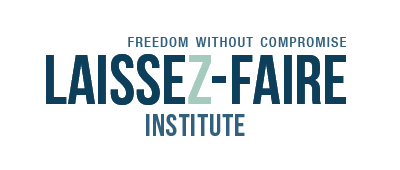Since “economic growth” is today’s great problem, and our present Administration is promising to “stimulate” it—to achieve general prosperity by ever wider government controls, while spending an unproduced wealth—I wonder how many people know the origin of the term laissez-faire?
France, in the seventeenth century, was an absolute monarchy. Her system has been described as “absolutism limited by chaos.” The king held total power over everyone’s life, work, and property—and only the corruption of government officials gave people an unofficial margin of freedom.
Louis XIV was an archetypical despot: a pretentious mediocrity with grandiose ambitions. His reign is regarded as one of the brilliant periods of French history: he provided the country with a “national goal,” in the form of long and successful wars; he established France as the leading power and the cultural center of Europe. But “national goals” cost money. The fiscal policies of his government led to a chronic state of crisis, solved by the immemorial expedient of draining the country through ever-increasing taxation.
Colbert, chief adviser of Louis XIV, was one of the early modern statists. He believed that government regulations can create national prosperity and that higher tax revenues can be obtained only from the country’s “economic growth”; so he devoted himself to seeking “a general increase in wealth by the encouragement of industry.” The encouragement consisted of imposing countless government controls and minute regulations that choked business activity; the result was dismal failure.
Colbert was not an enemy of business; no more than is our present Administration. Colbert was eager to help fatten the sacrificial victims—and on one historic occasion, he asked a group of manufacturers what he could do for industry. A manufacturer named Legendre answered: “Laissez-nous faire!” (“Let us alone!”)
Apparently, the French businessmen of the seventeenth century had more courage than their American counterparts of the twentieth, and a better understanding of economics. They knew that government “help” to business is just as disastrous as government persecution, and that the only way a government can be of service to national prosperity is by keeping its hands off.
To say that that which was true in the seventeenth century cannot possibly be true today, because we travel in jet planes while they traveled in horse carts—is like saying that we do not need food, as men did in the past, because we are wearing trenchcoats and slacks, instead of powdered wigs and hoop skirts. It is that sort of concrete-bound superficiality—or inability to grasp principles, to distinguish the essential from the non-essential—that blinds people to the fact that the economic crisis of our day is the oldest and stalest one in history.
Consider the essentials. If government controls could achieve nothing but paralysis, starvation, and collapse in a pre-industrial age, what happens when one imposes controls on a highly industrialized economy? Which is easier for bureaucrats to regulate: the operation of hand looms and hand forges—or the operation of steel mills, aircraft plants, and electronics concerns? Who is more likely to work under coercion: a horde of brutalized men doing unskilled manual labor—or the incalculable number of individual men of creative genius required to build and to maintain an industrial civilization? And if government controls fail even with the first, what depth of evasion permits modern statists to hope that they can succeed with the second?
The statists’ epistemological method consists of endless debates about single, concrete, out-of-context, range-of-the-moment issues, never allowing them to be integrated into a sum, never referring to basic principles or ultimate consequences—and thus inducing a state of intellectual disintegration in their followers. The purpose of that verbal fog is to conceal the evasion of two fundamentals: (a) that production and prosperity are the product of men’s intelligence, and (b) that government power is the power of coercion by physical force.
Once these two facts are acknowledged, the conclusion to be drawn is inevitable: that intelligence does not work under coercion, that man’s mind will not function at the point of a gun.
This is the essential issue to consider; all other considerations are trivial details by comparison.
The details of a country’s economy are as varied as the many cultures and societies that have existed. But all of mankind’s history is the practical demonstration of the same basic principle, no matter what the variants of form: the degree of human prosperity, achievement, and progress is a direct function and corollary of the degree of political freedom. As witness: ancient Greece, the Renaissance, the nineteenth century.
In our own age, the difference between West Germany and East Germany is so eloquent a demonstration of the efficacy of a (comparatively) free economy versus a controlled economy that no further discussion is necessary. And no theorist can deserve serious consideration if he evades the existence of that contrast, leaving its implications unanswered, its causes unidentified, and its lesson unlearned.
Now consider the fate of England, “the peaceful experiment in socialism,” the example of a country that committed suicide by vote: there was no violence, no bloodshed, no terror, merely the throttling process of “democratically” imposed government controls—but observe the present cries about England’s “brain drain,” about the fact that the best and ablest men, particularly the scientists and engineers, are deserting England and running to whatever small remnant of freedom they can find anywhere in today’s world.
Remember that the Berlin wall was erected to stop a similar “brain drain” from East Germany; remember that after forty-five years of a totally controlled economy, Soviet Russia, who possesses some of the best agricultural land in the world, is unable to feed her population and has to import wheat from semi-capitalist America; read East Minus West = Zero by Werner Keller, for a graphic (and unrefuted) picture of the Soviet economy’s impotence—and then, judge the issue of freedom versus controls.
Regardless of the purpose for which one intends to use it, wealth must first be produced. As far as economics is concerned, there is no difference between the motives of Colbert and of President Johnson. Both wanted to achieve national prosperity. Whether the wealth extorted by taxation is drained for the unearned benefit of Louis XIV or for the unearned benefit of the “underprivileged” makes no difference to the economic productivity of a nation. Whether one is chained for a “noble” purpose or an ignoble one, for the benefit of the poor or the rich, for the sake of somebody’s “need” or somebody’s “greed”—when one is chained, one cannot produce.
There is no difference in the ultimate fate of all chained economies, regardless of any alleged justifications for the chains.
Consider some of these justifications:
The creation of “consumer demand”? It would be interesting to compute how many housewives with relief checks would equal the “consumer demands” provided by Madame de Maintenon and her numerous colleagues.
A “fair” distribution of wealth? The privileged favorites of Louis XIV did not enjoy so unfair an advantage over other people as do our “aristocrats of pull,” the actual and potential variants of Billie Sol Estes or Bobby Baker.
The requirements of the “national interest”? If there is such a thing as a “national interest,” achieved by sacrificing the rights and the interests of individuals, then Louis XIV acquitted himself superlatively. The greater part of his extravagance was not “selfish”: he did build France up into a major international power—and wrecked her economy. (Which means: he achieved “prestige” among other totalitarian rulers—at the price of the welfare, the future, and the lives of his own subjects.)
The furtherance of our “cultural” or “spiritual” progress? It is doubtful that a government-subsidized theater project will ever produce an array of genius comparable to that supported by the court of Louis XIV in his role of “patron of the arts” (Corneille, Racine, Molière, etc.). But no one will ever compute the still-born genius of those who perish under systems of that kind, unwilling to learn the art of bootlicking required by any political patron of the arts. (Read Cyrano de Bergerac.)
The fact is that motives do not alter facts. The paramount requirement of a nation’s productivity and prosperity is freedom; men cannot—and, morally, will not—produce under compulsion and controls.
There is nothing new or mysterious about today’s economic problems. Like Colbert, President Johnson is appealing to various economic groups, seeking advice on what he can do for them. And if he does not wish to go down in history with a record similar to Colbert’s, he would do well to heed the voice of a modern Legendre, if such exists, who could give him the same immortal advice in a single word: “De-control!”

